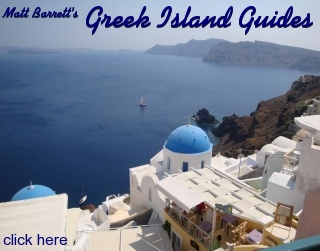Festivals, Celebrations &
Holidays in Greece
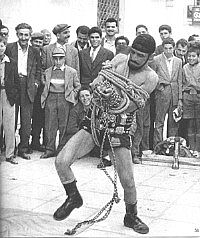 Scroll down for a list of Holidays, Festivals
and Celebrations held in Greece. I have tried to include all of them but
I am sure I have missed some. Also some of the dates may be different from
year to year so if an event sounds interesting to you, then you may want to
research it further so you don't show up at a village to find the party
was last week. I have not included all of the Saint's days just because
there are so many of them. Each church is devoted to a particular saint
and that saint's name day is usually celebrated with a Panigiri (festival),
and a religious service. On that day, people with the same name as the
saint celebrate their name day in the same way as we celebrate our birthdays.
When you go to a village ask one of the locals when the Panigiri for a
particular church is and if it happens to be during your stay, join in
the celebration. My favorite Saint's day is for the Prophet Elias because
it is held at a monastery or church on the highest point of an island
which is usually on top of a mountain. Also many islands and villages will
have a particular patron saint that they celebrate more then the others.
Find out who that Saint is and when the Panigiri is. Scroll down for a list of Holidays, Festivals
and Celebrations held in Greece. I have tried to include all of them but
I am sure I have missed some. Also some of the dates may be different from
year to year so if an event sounds interesting to you, then you may want to
research it further so you don't show up at a village to find the party
was last week. I have not included all of the Saint's days just because
there are so many of them. Each church is devoted to a particular saint
and that saint's name day is usually celebrated with a Panigiri (festival),
and a religious service. On that day, people with the same name as the
saint celebrate their name day in the same way as we celebrate our birthdays.
When you go to a village ask one of the locals when the Panigiri for a
particular church is and if it happens to be during your stay, join in
the celebration. My favorite Saint's day is for the Prophet Elias because
it is held at a monastery or church on the highest point of an island
which is usually on top of a mountain. Also many islands and villages will
have a particular patron saint that they celebrate more then the others.
Find out who that Saint is and when the Panigiri is.
The most important holidays in Greece are Easter, Apokreas (Carnival Season), August 15th (Saint's day of the Virgin Mary), March 25th (Independence Day), October
28th (Ochi Day) and Agios Pnevmatos which is a moveable feast 40 days after Easter and is a 3 day weekend when many people leave Athens for the islands and villages. Other important holidays are Clean Monday and May Day on May 1st.
Questions about Holidays in Greece? You can
e-mail me
|
|
The top photo is of the legendary
Jimmy Aramais, otherwise known as Samson, a familiar performer at street
fairs and celebrations in Greece for several decades who even as an old
man performed incredible feats. These and other black and white photos
I have used for this page come from the book Greece, published by
Hill and Wang in 1961 by Hans Reich Verlag in Munich. A marvelous photo
essay of Greece in the fifties the book is out of print which is a shame.
The photo of Samson is by Sabine Weis
|
|
January
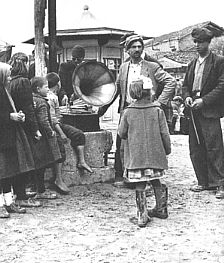
Photo by Paul Alamsy
January 1st:
-
Feast of St Basil. This is associated
with a good start for the new year. An old Byzantine custom of slicing
the Vassilopita (Basilcake or New Year Cake) gives the person who
finds the hidden coin in his slice, good luck for the year.
-
On the island of Andros there are special
New Years Celebrations.
-
In the community of Plaki near Veria
there is a reenactment of the old customs of Farasson in Cappadocia.
-
In the Emborio Eordaias Community near
Kozani the young men of the village turn out in local national costume
dancing popular dances to the accompanyment of traditional musical instruments.
-
At Polikastro, near Kilkis there are
folkloric celebrations in fancy Dress.
January 6th
-
Epiphany is celebrated throughout Greece
when the Blessing of the Waters takes place. A cross is thrown into
the sea, lakes or rivers and retrieved by swimmers who are then entitled
to good luck. The event is particularly spectacular in Pireaus.
-
In Kozani the Lougatsaria
or Karnavalia folkloric celebrations are held.
-
Similar celebrations are held in Kastoria
known as the Ragoutsiaria and go on until the 8th.
-
This day is the name day for Fotini.
January 7th
-
In the town of Katerini and in the quarter
known as Katafigioton there is a revival of the old custom of Prodomition
who were the forerunners of the national liberation when the country was
still under Ottoman rule.
-
Name Day for Yannis and Yanna
January 8th
-
The custom of female dominion or matriarchy
is observed in the villages of Monoklissia and N. Petra in
the region of Seres. On this day the women hang out in the cafeneons
while the men stay home with the children and the chores. At nightfall
they are allowed to join the women in celebration. This custom also takes
place in the villages of Strimi and Xilagani in the Komotini
region and at Nea Kassani near Xanthi. A similar celebration
takes place in the village of Aspro near Kilkis for women.
In the evening festivities only married couples may take part.
-
January 17th is Saint Andonis day.
-
The 18th is Saint Athanasios day.
-
The 27th is Saint Crisostomos day.
|
|
February
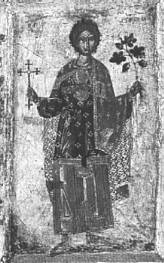
In late Mid February Greece's Carnival
Season called Apokrias, begins and lasts two weeks. It
is similar to Mardi Gras in New Orleans and the festivities are particularly
enjoyable in Naousa, Veria, Kozani, Zante, Skyros, Xanthi, Chios(in Mesta,
Olimbi, Thymiana), Galaxidi, Thebes(where a mock shepards wedding is held),
Poligiros, Lamia, Kephalonia, Messini, Soho, Seres, Agiassos in Lesvos,
Karpathos, Heraklion, Crete, Amfissa, Efxinoupolis(Volos), Agia Ana(Evia), Rethymnon, Crete
and especially in Patras and in The Plaka
of Athens
-
February 1st is St Tryphon's name day
-
February 3rd is Symeon and Annis
Day
-
February 10th is the name day for Heraclia
and
Haralambos.
-
February 14th is the day of Saint Valentina.
|
|
March
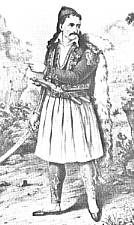
Clean Monday or Katheri Deftera
40 days before Easter, marks the first day of lent and it is customary
to go out in the country and fly paper kites.
-
March 2nd is Saint Theodore day.
- March 19th is Crysanthos Day.
- March 25thIndependence Day
The Greek National Anniversary and
a major religious holiday with military parades in the larger towns and
cities.This celebrates Greece's victory in the war of Independence against
the Turks who had occupied the country for 400 years. The 25th of March
was actually the day Bishop Germanos of Patras raised the flag of national
rebellion at the monastery of Agia Lavra in the northern Peleponisos.
For Greece, the 25th of March is the equivalent to the 4th of July to Americans. The Greeks celebrate this day with marches and celebrations throughout the country. Consequently, the Acropolis and all other archaeological sites and all museums are closed on this day. You are supposed to eat fried bakaliaro (cod) and skordalia (garlic sauce) today. Don't ask me why. I just do it.
|
|
April
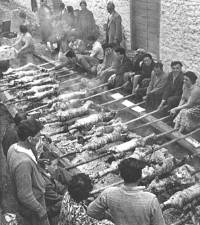
Photo by Toni Schnieders
Easter
Celebrations begin in April or May. Check
with your local Greek church for exact dates since it changes every year.
See my Greek Easter Page for lots more information on this important holiday.
-
On Good Friday the people of the towns
and villages carry candles and follow the procession of the Epitaph.
-
Saturday in Holy Week the ceremony of the resurrection
takes place in the courtyard in front of all churches and bells are rung
all over the towns and cities. Candles are lit one from the other and then
the people make their way home for the traditional feast of dyed red Easter
eggs and Magaritsa soup.
-
Easter Sunday is the biggest church holiday
in Greece. All over the country lambs are roasted on a spit and there is
wine in abbundance. Red eggs are cracked against each other and the person
with the last remaining uncracked egg will have good luck. This is the
most beautiful time to be in Greece if the weather is good.
- In Crete the village of Harakas Monofatsiou
have a special Easter Sunday celebration in which they burn an effigy of
Judas Iskariot.
-
On the island of Crete you will find
many villages who prepare for the bonfire effigy of Judas. Just take
a trip through any rural area in the week leading up to Easter Sunday and
enjoy the sight of men and women on their donkeys gathering sticks and
branches in preparation for the effigy burning.
-
Anastasia and Anastasios celebrate their
name day on Easter.
April 8th
-
In Karpathos in the traditional village
of Olymbos there is a celebration known as the Lambri Triti.
-
At Limenaria in Thassos there is a feast
with local dancing.
-
In Megara near Athens local women in
traditional outfits dance the fishermens Trata.
April 23rd
-
Feast of Saint George is celebrated on
Lemnos in the village of Kaliopi with horse races. In Arahova
near Delphi there is a three day non-stop feast. In Assi Gonia near Chania,
Crete the religious celebration is folllowed by a sheep-shearing contest
among the local shephards. In the village of Pili on the island
of Kos there are horse races followed by song and dancing. Between the
22nd and 23rd a festival is held at the Monastery of Agios Yiorgos Peristereotas
in the village of Rodohori where local Pontos dances are
performed.
-
April 15th is Leonidas name day.
-
April 24th is Elizabeth's name day.
-
April 25th is Saint Markos name day
-
Saint Thomas name day is celebrated the
Sunday after Easter.
|
|
May
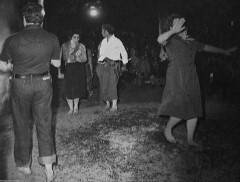
In the month of May there is a folkloric
festival at Eleusis near Athens. On the island of Lesvos the month
of May holds the Week of Prose and Art with theatrical performances,
exhibitions and various cultural and educational events in Molyvos.
In Trikala the Hadjipetria Festival which features
athletic contests, national dances and lectures takes place around the
end of the month.
May 1st
-
Labor day and the Feast of the Flowers.
There is a general exodus to the country for picnics and the sky is filled
with kites.
May 21st
-
Celebration of the Unification of the Ionian
Islands with the rest of Greece takes place on the island of Corfu.
-
In Rethymnon, Crete they celebrate the anniversary
of the battle of Crete.
-
In Kassos there is a fiesta in Vrissi
with local songs and dancing.
May 20th to 30th
-
In Karditsa the Kariaskaki
folkloric celebration with dancing, parades and pagentry honoring the lives
of the guerillas who fought Ottoman rule.
May 21st-23rd
-
The Anasternaria is the traditional
fire walking which dates back to pagan times. Barefoot villagers of Agia
Elleni near Serres and at Langada near Thessaloniki,
clasp icons of Saint Constantine and Saint Helen and dance upon charcoal
embers without getting burned.
-
May 21st is the celebration day of Saints
Constantine and Eleni.
May 29th
-
The Paleological Festival at Mistras
is combined with a requiem mass in memory of Constantine Paleologos, the
last of the Byzantine emperors.
|
|
June

Towards the end of June in the town of Agia
Paraskevis in Lesvos is a 3 day Festival of the Bull with live
music, celebration and horse races through the streets.
-
In June in the village of Krousta in
Crete is the Feast of the Klidona.
-
At the end of June and early July, Navy Week
is celebrated with entertainment in many of the ports of Greece. In Molyvos
and Kaloni in Lesvos the ouzo and sardines flow freely.
-
June 2nd on Lesvos in the town of Kaloni
is the festival of the Holy Trinity with horse races and wine.
-
Early June in Florina is the Festival
of Local Dances.
-
In Alexandroupolis is the anual flower
show, heldf the first ten days of the month.
-
A Sunday is chosen between the 25th of June
and the 15th of July for the Flowers and Cherry Blossom Dance at
the village of Emborio in Kozani.
- The Miaoulis Festival, the last weekend in June on HYDRA,
a celebration of the great admiral Miaoulis, from the war for independence. There are different activities in the town like dance performances, speeches, brass bands etc. The big performance is on Saturday evening. There is a “water theatre” in the harbour where they show “the great sea battle” with the burning of a Turkish flagship. Afterwards there is a spectacular
firework (and sometimes an unexpected grass fire).
- The Holiday of Agios Pnevmatos (Holy Spirit) is a 3-Day weekend similar to Memorial Day in the USA. All the islands are full as are the ferries going there on Thursday and Friday and returning on Sunday-Monday-Tuesday. It is a moveble feast and which weekend it falls on depends on when Orthodox Easter was. It is the second biggest holiday of the summer after the Panagia Name Day in August. If you are traveling to the islands during
this weekend make sure you have a hotel and ferry tickets. On the other hand this is a great time to be in Athens because it is empty.
- EUROPEAN MUSIC DAY: June 21st of June is no ordinary day. It’s the summer solstice – the longest day of the year. And it is also European Μusic Day. Music all over Greece for three days. If you are in Athens there will be live shows in every square in town.
|
|
July
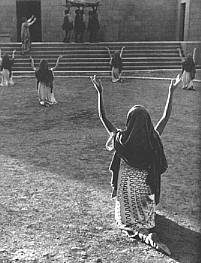
Photo by D.A. Harissiadis
-
In July the village of Rethymnon in Crete
has a wine festival while in mid July another wine festival is held in
Heraklion.
-
Throughout July and August in Ioanina
is the Eprirus Festival including Epirus authors, paintings, popular
art, theatrical performances and dances by Greek and foreign troupes, thaetrical
performances for children and concerts.
-
In Nafpaktos is the Papaharalambia
Festival of artistic, nautical and athletic events which lasts a week.
-
In Preveza they hold the Nikololia
Ancient Drama and folkloric performances.
-
In Fillatria, near Kyparissia they hold
the Vlahernia events during the first ten days of the month. These
include theatrical performances, dance groups and so on.
-
In Kalamata they hold traditional folk
dances in the medieval castle for the entire month.
-
In Corfu they have Cricket Week
with visiting teams participating in matches on the only island where the
sport is played regularly.
-
In mid-July in Elefsis near Atrhens there is
a folklore festival.
-
At the end of July in Sitia on the island
of Crete is the Sultana Raisin Festival.
-
In July and August the Odeon of Herod Atticus
Festival is held in the famous theatre next to the Acropolis with well
known performers from all over the world.
-
Also in July the Epidavros Festival of Greek
Tragedies is held at the little theatre of Epidavros.
-
The Heraklion Festival is held from July
through September and features some of Greece's most popular musicians
as well as theatrical performances.
-
The Patras Festival through September
brings the best in Classical, Rock, Blues and theatre to the Ancient Odeon
of this port city.
-
July 7th: Agia Kyriaki with a festival
in the village of Petri on the island of Lesvos.
-
July 8th: Corfu: The village of Lefkimi
has a festival which includes local dances.
-
July 20th: The Panagiri day for the Prophet
Elias, usually held at the highest church or monastery.
-
21-22nd of July: The beach village of Agia
Markela on the island of Chios holds a religious festival with dancing.
-
July 20th: In Santorini the village of Pirgo
Kalistis has a big festival.
-
July 22nd: In the village of Skopelos
in Lesvos they celebrate the day of Saint Magdeleni.
- July 27th: In the village of Anaxos on Lesvos they celebrate Saint Pandelimos with live music.
|
|
August
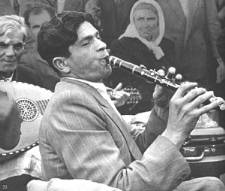
Photo by Paul Almasy
-
During the first week of August the town of
Kaloni
in Lesvos holds its Sardine Festival with fish, ouzo, live music
dancing and other events.
-
Also in Lesvos during Mid August the Aegean
Symposium is held in Molyvos with theatrical and other cultural
events held in the castle overlooking the city.
-
In Late August on the island of Zante
the Aniversary of the island's Patron Saint Dionysious is held with
dancing, drinking and fireworks.
-
On the island of Skyros horse racing
with the local breed of small ponies. The jockeys wear special local costumes
and the village maidens dressed as brides in traditional costume dance.
-
Prose and Art Festival in Lefkas.
-
The Olympus Festival in the village of
Litohoro in Katerini includes various artistic events held in the old
castle.
-
In Naousa in Paros the Pirate Raid
Pagentry is held.
-
In Rethymnon, Crete the Sultana Raisin
Festival is held.
-
In Early August in Zante they hold the
International
Meeting of Medieval and Popular Theatre.
-
The first week of August in the village of Anogia,
Crete a festival is held with hospitality offered to visitors.
-
On the island of Kos the Hypocratia
Festival is held which includes, musical, dramatic and artistic performances
and Athletic contests.
-
In Gythion in mid-August they hold a
festival which includes ancient drama.
-
August 6th is the Transfiguration of Christ
and
the name day for Sotiris.
-
August 11th is the day that Saint Spiridon appeared with a lighted torch and scared the Turkish invaders away from the island of Corfu. This day is celebrated as a holiday in Corfu.
August 15th: The day of the Panagia (Virgin
Mary)
This is the second biggest religious holiday
after Easter and on the island of Tinos this day is celebrated like
on no other. Pilgrims by the thousands come here to crawl on their knees
up the steps to the church that holds the holy Icon. But this day is also
celebrated in almost every town and village in Greece especially those with a church dedicated to the Panagia (Virgin Mary). That means on the days leading up to it every boat is full and in the islands every hotel is full so keep this in mind if you are traveling these dates. But in general booking a hotel on any island in August is difficult if you don't do it in advance.
-
Agiassos in Lesvos, the second most Holy
place in Greece, the pilgrims begin arriving weeks before the 15th and
by the 10th of the month the town is alive with ceremony, both religious
and social, live music etc. It's quite a party.
-
Petra in Lesvos, similar to Agiassos
but not as big.
-
Stipsi in Lesvos celebrates for 9 consecutive
days after the 15th.
-
In Paros the Panagiri coincides with
the local wine festival, always a good combination.
-
Anwhere you go there will be a celebration at
one church or another with dancing, food and services. Usually they go
on until dawn. The best ones are held in the Monasteries like Profit Elias.
- August 30th is the name day for Saint Alexandros.
|
|
September

Photo by Pitt Koch
From the 1st to the 15th is the Anhiolos
Wine Festival in Thessaloniki. Also in Thessaloniki in September is
the International Trade Fair which includes the Song and Film
Festival. In Messolongi they hold the Lord Byron Poetry and Art festival.
In Kos there is a 2 day wine Festival with song and dance. There are Grape
festivals in Corinth, Pidni near Katerini, and a wine festival in the
village of Ambelona near Larissa. Towards the end of September in Kythira
is the festival of the Myrtidiotissa Monastery. In Santorini the
International
Music Festival in Thira features well known orchestras, conductors
and performers of Classical music.
September 17th is the name day for Saint
Sophia.
September 27th is my birthday. You can wish me a happy birthday by e-mail or ask me why I would include my own birthday on a list of Greek holidays.
September 29th is the name day for Saint
Kyriakos.
|
|
October
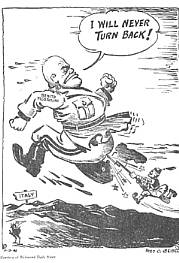
Cartoon by Fred Seibel/Richmond
Daily News Nov.19, 1940
In Thessaloniki the Demmetria Artistic
and Cultural events. In Larissia the Eleftheria Festival of
popular dances and theatrical performances. Around the 21st of the month
is the Chestnut festival of Elos near Kissamos, Crete.
-
The 8th is the celebration of Saint Iganatios
at the Limonas monastery in Kaloni, Lesvos
-
The 21st is the name day for Socrates.
-
The 26th is the name day for Saint Dimitris.
-
The 28th is Ochi Day, celebrating the
Greek refusal to let Italy occupy the country during WWII. The Italians
invaded and were driven back into Albania and nearly back to Italy. There
are military parades in the major towns and cities.
|
|
November

Photo from the book Today
Facism Dies by Yanni Fatsi
The 17th of November is the anniversary
of the student uprising at the Polytechnic University in Athens in 1973.
The demonstrations against the military dictatorship gained momentum and
was crushed when tanks crashed the gates of the university killing many
students. The holiday is celebrated with the annual march and stoning of
the American Embassy. If you have business at the Embassy it is a good
idea to save it for another day.
-
The first week of the month is the anniversary
of the holocaust at the Arkadi Monastery in Rethymnon Crete.
-
November 8th is the celebration day for Michael
and Gabriel.
-
November 14th is the name day for Philippos.
-
November 21st is the name day for any Mary
that is a virgin and children.
-
November 30th is the name day for Saint Andreas.
|
|
December
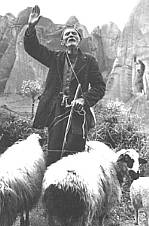
Photo by Paul Almasy
-
In the beginning of the month the island of
Corfu
celebrates the memory of their Patron Saint Spyridon.
-
On the 4th is Saint Barbara day a big
day for the Military since Barbara is their Patron Saint.
-
The 5th is Saint Savas day.
- The 6th is Saint Nicholas day.
- The 6th is also the day that Alexandros Grigoropoulos, a high school student, was shot by the police in Exarchia and though it is not an "Official Holiday" many young people celebrate this day by going to Exarchia and fighting with the cops. It is probably a good day to stay out of Exarchia.
-
The 9th is Saint Anna day.
-
The 13th is the name day for Saint Efstratos.
-
The 17th is the name day for Dionysos of
Zakynthos.
-
On the 23rd in Kozani they commemorate
the shepherds who lit the bonfires to announce the birth of Jesus Christ.
Known as the Kladaries, the actual ceremony takes place in the village
of Siatista where the locals light fires and dance around them while
drinking the local wines. The three best bonfires win prizes.
-
The 24th is Christmas Eve and young children
walk around singing carols on trains, buses and neighborhoods.
-
23rd and 24th in Florina they light fires
in different quarters of the town and the inhabitants walk from fire to
fire singing Christmas carols.
-
The 25th is the name day for Christos.
-
The 27th is the name day for Stefanos.
-
31st of December in Chios the island's
seamen carry around 3 meter models of ships singing island songs. They
end up at the central square and the four best models win a prize.
-
New Years Eve is spent playing cards
with friends on a green card table, while children sing carols and people
exchange gifts. But most young people go out to bars and parties just as you would.
|
Other Useful Greece Holiday Information
|
|
Other Useful Sites: Greek Islands, Easter in Greece, Apokreas-Carnival, Greek Weather, Books
about Greece, Travel Agents & Tours, Athens Guide, Mainland Greece
|
|
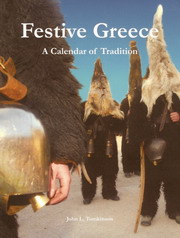 Festive
Greece: A Calendar of Tradition by John L. Tomkinson is a comprehensive
calendar of the folk, religious, military and commemorative festivals
of Greece. It is the only detailed guide of it's kind in print in
English. Included are in-depth studies of many of the more interesting
and exotic manifestations of popular culture such as the mysterious
figures dressed in animal skins and sheep bells which roam the streets
of Northern greece during the winter and spring carnival seasons,
the many variations on the popular cermonies of Holy Week and Easter,
the fire-walking Anastenarides (probably remnants of Dionysion cults),
the bull sacrifices of Lesvos, the annual appearance of the Virgin's
serpents in Kefalonia and much more. From proud military parades commemorating
the trials and victories of the modern greek state, to children's
spring carol festivities which have survived unchanged from ancient
times, this beautifully illustrated guide provides the key to a
more eventful stay in Greece and a better appreciation of its colorful
past. You can find this book in most English-language
bookshops in Athens or through Greece-in-Print Festive
Greece: A Calendar of Tradition by John L. Tomkinson is a comprehensive
calendar of the folk, religious, military and commemorative festivals
of Greece. It is the only detailed guide of it's kind in print in
English. Included are in-depth studies of many of the more interesting
and exotic manifestations of popular culture such as the mysterious
figures dressed in animal skins and sheep bells which roam the streets
of Northern greece during the winter and spring carnival seasons,
the many variations on the popular cermonies of Holy Week and Easter,
the fire-walking Anastenarides (probably remnants of Dionysion cults),
the bull sacrifices of Lesvos, the annual appearance of the Virgin's
serpents in Kefalonia and much more. From proud military parades commemorating
the trials and victories of the modern greek state, to children's
spring carol festivities which have survived unchanged from ancient
times, this beautifully illustrated guide provides the key to a
more eventful stay in Greece and a better appreciation of its colorful
past. You can find this book in most English-language
bookshops in Athens or through Greece-in-Print
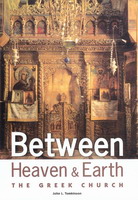 Between
Heaven and Earth: The Greek Church by John L Tomkinson is an
introduction to the Orthodox church which is as old as Christianity
itself. The first part is about the buildings and their furnishings,
services, customs, festivals, faith, government and constituent
institutions of the Church. The second part contains a brief history
of the Church from its apostolic beginnings to the problems it faces
today. From the picturesque ceremony of crowning the bride and groom
at their wedding, to the interpretation of the symbolism of icons,
to Mount Athos, the monastic republic whhere women are forbidden
to set foot, this book provides the visitor with the means to make
a holiday in Greece more interesting.
You can find this book in most English-language bookshops in Athens or you can order this book through Greece-in-Print Between
Heaven and Earth: The Greek Church by John L Tomkinson is an
introduction to the Orthodox church which is as old as Christianity
itself. The first part is about the buildings and their furnishings,
services, customs, festivals, faith, government and constituent
institutions of the Church. The second part contains a brief history
of the Church from its apostolic beginnings to the problems it faces
today. From the picturesque ceremony of crowning the bride and groom
at their wedding, to the interpretation of the symbolism of icons,
to Mount Athos, the monastic republic whhere women are forbidden
to set foot, this book provides the visitor with the means to make
a holiday in Greece more interesting.
You can find this book in most English-language bookshops in Athens or you can order this book through Greece-in-Print
|
|

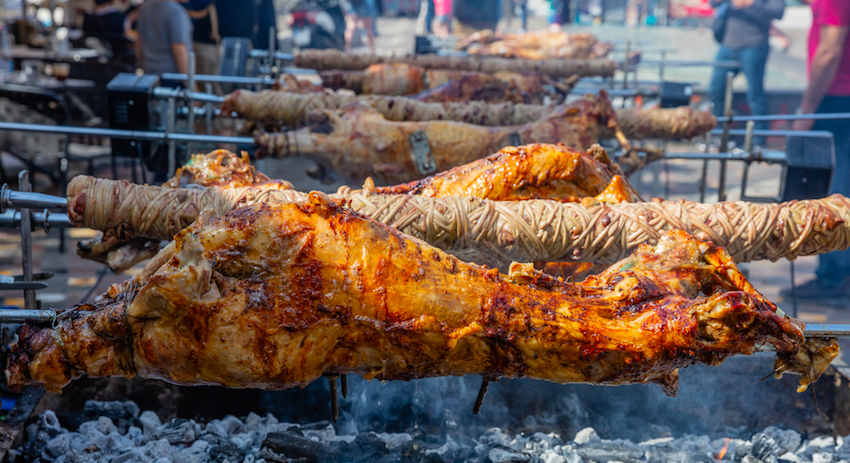









 Festive
Greece: A Calendar of Tradition by John L. Tomkinson is a comprehensive
calendar of the folk, religious, military and commemorative festivals
of Greece. It is the only detailed guide of it's kind in print in
English. Included are in-depth studies of many of the more interesting
and exotic manifestations of popular culture such as the mysterious
figures dressed in animal skins and sheep bells which roam the streets
of Northern greece during the winter and spring carnival seasons,
the many variations on the popular cermonies of Holy Week and Easter,
the fire-walking Anastenarides (probably remnants of Dionysion cults),
the bull sacrifices of Lesvos, the annual appearance of the Virgin's
serpents in Kefalonia and much more. From proud military parades commemorating
the trials and victories of the modern greek state, to children's
spring carol festivities which have survived unchanged from ancient
times, this beautifully illustrated guide provides the key to a
more eventful stay in Greece and a better appreciation of its colorful
past. You can find this book in most English-language
bookshops in Athens or through
Festive
Greece: A Calendar of Tradition by John L. Tomkinson is a comprehensive
calendar of the folk, religious, military and commemorative festivals
of Greece. It is the only detailed guide of it's kind in print in
English. Included are in-depth studies of many of the more interesting
and exotic manifestations of popular culture such as the mysterious
figures dressed in animal skins and sheep bells which roam the streets
of Northern greece during the winter and spring carnival seasons,
the many variations on the popular cermonies of Holy Week and Easter,
the fire-walking Anastenarides (probably remnants of Dionysion cults),
the bull sacrifices of Lesvos, the annual appearance of the Virgin's
serpents in Kefalonia and much more. From proud military parades commemorating
the trials and victories of the modern greek state, to children's
spring carol festivities which have survived unchanged from ancient
times, this beautifully illustrated guide provides the key to a
more eventful stay in Greece and a better appreciation of its colorful
past. You can find this book in most English-language
bookshops in Athens or through  Between
Heaven and Earth: The Greek Church by John L Tomkinson is an
introduction to the Orthodox church which is as old as Christianity
itself. The first part is about the buildings and their furnishings,
services, customs, festivals, faith, government and constituent
institutions of the Church. The second part contains a brief history
of the Church from its apostolic beginnings to the problems it faces
today. From the picturesque ceremony of crowning the bride and groom
at their wedding, to the interpretation of the symbolism of icons,
to Mount Athos, the monastic republic whhere women are forbidden
to set foot, this book provides the visitor with the means to make
a holiday in Greece more interesting.
You can find this book in most English-language bookshops in Athens or you can order this book through
Between
Heaven and Earth: The Greek Church by John L Tomkinson is an
introduction to the Orthodox church which is as old as Christianity
itself. The first part is about the buildings and their furnishings,
services, customs, festivals, faith, government and constituent
institutions of the Church. The second part contains a brief history
of the Church from its apostolic beginnings to the problems it faces
today. From the picturesque ceremony of crowning the bride and groom
at their wedding, to the interpretation of the symbolism of icons,
to Mount Athos, the monastic republic whhere women are forbidden
to set foot, this book provides the visitor with the means to make
a holiday in Greece more interesting.
You can find this book in most English-language bookshops in Athens or you can order this book through 

